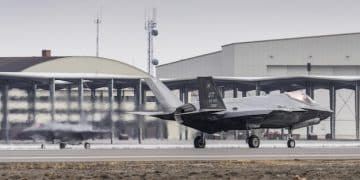Defense Industry Lobbying: Understanding Influence in Washington

Defense Industry Lobbying: Understanding the Influence of Special Interests in Washington involves the efforts of defense companies to influence government policies, contracts, and regulations through various lobbying activities. These efforts can significantly impact national security priorities and resource allocation.
The landscape of Washington D.C. is heavily influenced by various interest groups, and few are as prominent and impactful as the defense industry. Defense Industry Lobbying: Understanding the Influence of Special Interests in Washington is crucial for anyone seeking to grasp the intricacies of political decision-making in the United States.
This article explores the multifaceted world of defense industry lobbying, examining its methods, impact, and implications for national policy. What exactly does this lobbying entail, and why is it so pervasive? Let’s delve into the strategies and consequences of this powerful force in American politics.
Defense Industry Lobbying: A Deep Dive into Special Interests
Defense industry lobbying refers to the activities undertaken by defense contractors and related organizations to influence government policies, procurement decisions, and regulatory frameworks. These efforts aim to promote their business interests by securing lucrative contracts and shaping legislation favorable to their industry. This form of lobbying is pervasive in Washington, D.C., due to the vast sums of money at stake and the constant demand for military technology and equipment.
The Role of Lobbyists
Lobbyists act as intermediaries between defense companies and government officials, providing information, advocating for their clients’ positions, and building relationships. They employ various tactics to gain influence, including direct communication, campaign contributions, and public relations campaigns. Understanding their role is key to Defense Industry Lobbying: Understanding the Influence of Special Interests in Washington.
- Direct Communication: Lobbyists directly engage with policymakers, providing them with data and arguments supporting their clients’ interests.
- Campaign Contributions: Financial support to political campaigns helps gain access and build rapport with elected officials.
- Public Relations: Shaping public opinion through media and outreach efforts can indirectly influence policy decisions.

The defense industry’s substantial lobbying efforts are driven by the desire to secure government contracts, influence defense spending priorities, and shape regulations affecting their operations. These activities have significant implications for national security, economic policy, and the overall political landscape. It’s important to critically assess the impacts of Defense Industry Lobbying: Understanding the Influence of Special Interests in Washington.
The Mechanics of Defense Lobbying
The mechanics of defense lobbying involve a multi-faceted approach to influencing policy outcomes. This includes strategic campaign contributions, detailed policy advocacy, and cultivating strong relationships with key decision-makers. The ultimate goal is to navigate the complex regulatory environment and secure favorable conditions for defense contractors. This makes understanding the mechanics of Defense Industry Lobbying: Understanding the Influence of Special Interests in Washington essential.
Campaign Contributions
Campaign contributions are a significant component of defense lobbying. Defense companies and their political action committees (PACs) donate substantial sums to political campaigns, particularly those of members of Congress serving on relevant committees, such as the Armed Services and Appropriations Committees. However, this is only one part of the intricate world of Defense Industry Lobbying.
Policy Advocacy
Policy advocacy involves direct engagement with policymakers to promote specific legislative or regulatory changes. Lobbyists provide detailed information, expert testimony, and persuasive arguments to convince lawmakers to support their clients’ positions. They monitor legislative developments closely, identify opportunities to influence the process, and work to shape outcomes to their advantage.
Cultivating relationships with key decision-makers is crucial for effective defense lobbying. Lobbyists spend considerable time building rapport with members of Congress, officials within the Department of Defense, and other influential figures. These relationships provide them with access, information, and opportunities to advance their clients’ interests. The role of these relationships in Defense Industry Lobbying is often underestimated.
Ethical Considerations in Defense Lobbying
Defense lobbying raises several ethical considerations due to the potential for conflicts of interest, undue influence, and the prioritization of corporate interests over public welfare. Balancing the need for a strong national defense with the imperative of ethical governance is a central challenge in this arena. Reflecting on ethical concerns is crucial when discussing Defense Industry Lobbying: Understanding the Influence of Special Interests in Washington.
- Conflicts of Interest: The close relationships between defense contractors and government officials can create conflicts of interest, where decisions are influenced by personal gain rather than public interest.
- Undue Influence: The financial resources and political connections of defense companies can give them disproportionate influence over policy decisions, marginalizing the voices of other stakeholders.
- Prioritizing Corporate Interests: Lobbying efforts may prioritize the financial interests of defense companies over the broader goals of national security, economic stability, and social welfare.
Transparency and accountability are essential to mitigate these ethical concerns. Disclosure requirements, ethics regulations, and independent oversight mechanisms can help ensure that defense lobbying activities are conducted in a manner that serves the public interest and promotes fair competition. This is a core element of responsible Defense Industry Lobbying: Understanding the Influence of Special Interests in Washington.

Revolving Door Phenomenon
The “revolving door” phenomenon, where individuals move between government service and lobbying positions, creates further ethical challenges. Former government officials who become lobbyists may leverage their expertise and connections to benefit their new employers, raising concerns about undue influence and potential breaches of public trust.
The Economic Impact of Defense Lobbying
The economic impact of defense lobbying is significant, influencing resource allocation, government spending, and industrial development. Defense contracts secured through lobbying efforts can drive economic growth in certain regions but may also divert resources from other sectors, creating winners and losers. Analyzing economic effects is integral to Defense Industry Lobbying: Understanding the Influence of Special Interests in Washington.
Job Creation and Regional Development
Defense spending and contracts can create jobs and stimulate economic activity in regions where defense companies are located. Lobbying efforts to secure these contracts can therefore have a positive impact on local economies, though the benefits may not be evenly distributed.
The concentration of economic power in the hands of a few large defense contractors raises concerns about monopoly power and reduced competition. Lobbying can reinforce this dynamic by helping these companies secure preferential treatment and maintain their dominance in the market. It is crucial to analyze Defense Industry Lobbying: Understanding the Influence of Special Interests in Washington.
Ultimately, the economic impact of defense lobbying is complex and multifaceted. While it can drive innovation, create jobs, and stimulate economic growth, it also carries risks of misallocation of resources, increased debt, and undue influence over economic policy. A balanced perspective is essential to assess the overall effects. The need for balance in Defense Industry Lobbying: Understanding the Influence of Special Interests in Washington is paramount.
The Future of Defense Lobbying in the U.S.
The future of defense lobbying in the U.S. will likely be shaped by technological advancements, evolving geopolitical dynamics, and shifting public attitudes. As new technologies emerge and global threats evolve, defense companies will adapt their lobbying strategies to reflect these changes. This adaptation is at the heart of Defense Industry Lobbying: Understanding the Influence of Special Interests in Washington.
Technological Innovation
Technological innovation is transforming the defense industry, creating new opportunities for companies to develop and market cutting-edge weapons systems, cyber warfare capabilities, and surveillance technologies. Lobbying efforts will focus on securing government funding for these initiatives and shaping regulations to promote their adoption. The influence of technology on Defense Industry Lobbying: Understanding the Influence of Special Interests in Washington cannot be overstated.
Geopolitical shifts, such as the rise of new global powers and the increasing complexity of international conflicts, will also influence defense lobbying. Defense companies will seek to position themselves as essential partners in addressing these challenges, advocating for increased defense spending and the development of new military capabilities. This adaptation to geopolitical climates defines Defense Industry Lobbying: Understanding the Influence of Special Interests in Washington.
- Public Opinion: Shifting public attitudes toward defense spending and military intervention will likely shape the political context in which defense lobbying takes place.
- Transparency: Increased calls for transparency and accountability may lead to tighter regulations on lobbying activities and campaign finance.
- Evolving Threats: Adaptations to new threats will require the defense industry to innovate and justify its expenditures, impacting lobbying agendas.
The future of defense lobbying will depend on how these forces interact and the choices policymakers make in response. Greater transparency, ethical guidelines, and public engagement are needed to ensure that defense lobbying serves the national interest and promotes responsible governance. Therefore, future actions in Defense Industry Lobbying: Understanding the Influence of Special Interests in Washington must be strategic.
| Key Aspect | Brief Description |
|---|---|
| 💰 Campaign Contributions | Financial support given to political campaigns. |
| 🤝 Policy Advocacy | Direct engagement to influence regulations. |
| 🤔 Ethical Concerns | Potential conflict of interest and influence. |
| 🌟 Transparency | Disclosure requirements and oversight in lobbying. |
Frequently Asked Questions
It’s the effort by defense firms to sway government policies and secure contracts through various means, significantly impacting national security priorities and resource allocation.
Due to the high stakes involved, large budgets, and continuous need for military technology and equipment, it is a constant and major player in political discussions.
Lobbyists use direct communication, campaign contributions, and public relations to build relationships and advocate for the interests of defense companies with policymakers.
Ethical considerations include conflicts of interest, undue influence, and the potential prioritizing of corporate interests over public welfare in decision-making processes.
Transparency, accountability, stricter regulations, and independent oversight are essential to ensure that defense lobbying serves the public interest, fostering fair competition.
Conclusion
Defense Industry Lobbying: Understanding the Influence of Special Interests in Washington is vital for promoting transparency, accountability, and ethical governance. Scrutinizing lobbying activities can help ensure that policy decisions serve the broad national interest and promote responsible defense spending.
As technology and geopolitical issues evolve, so too will the landscape of defense lobbying. By acknowledging these shifts, we can strive for policies that balance defense needs with integrity, benefiting both our nation and its citizens.





